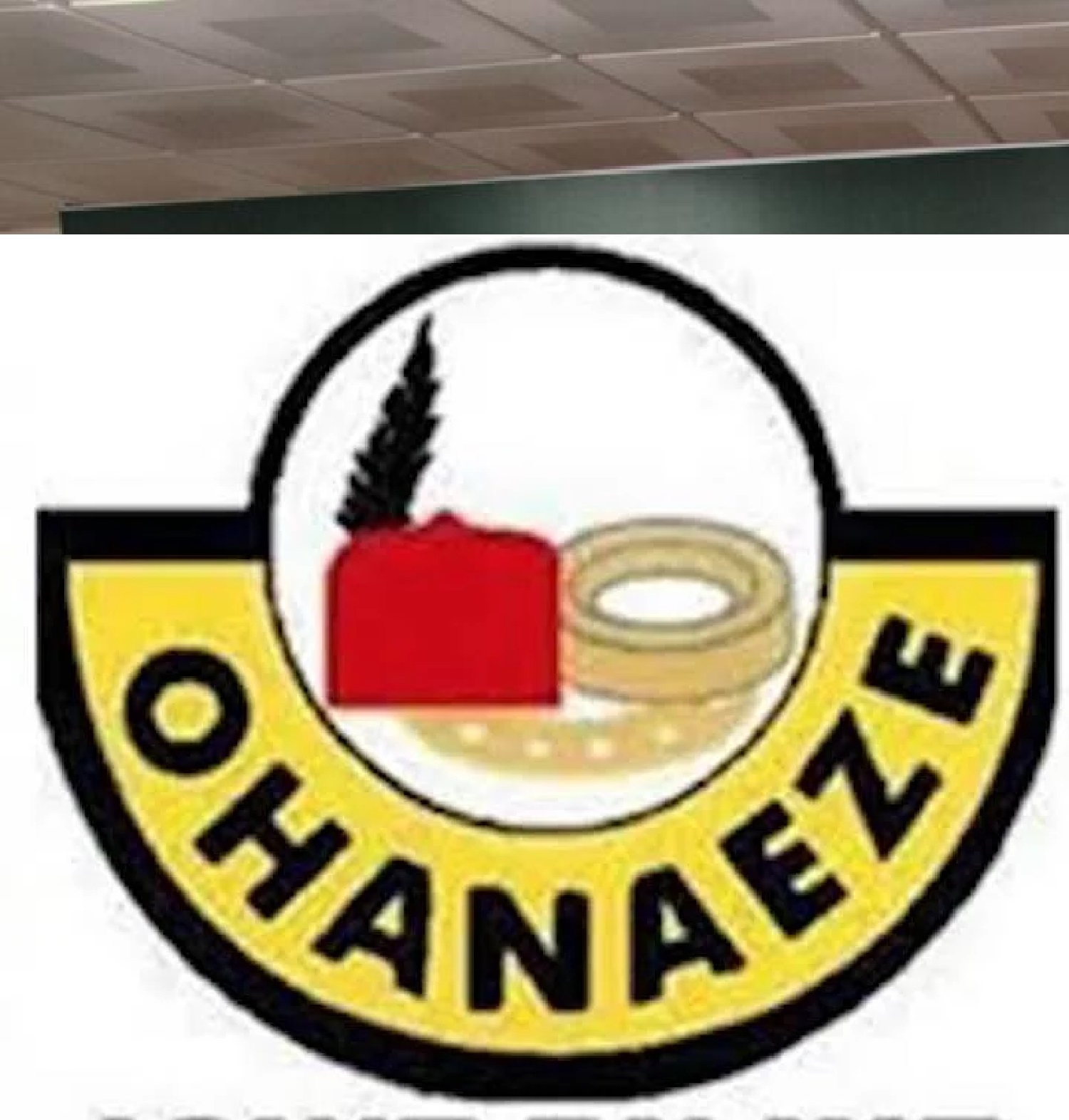 …Nigeria is in a mess — Afenifere
…Nigeria is in a mess — Afenifere
…Insecurity has become unbearable — PANDEF
…OPS expresses grave concerns over Nigerian economy, says realities on ground frightening
By Anayo Okoli, Dapo Akinrefon, Victor Ahiuma-Young, Samuel Oyadongha, Johnbosco Agbakwuru & Ibrahim HassanWuyo
PRESIDENT Muhammadu Buhari, yesterday, said that only God can effectively supervise the 1,400 kilometers border between Nigeria and Republic of Niger.
This came as influential Financial Times of London, said the spate of insecurity in the country shows that “the Nigerian government is no longer in control,” noting that Nigeria was at risk of becoming a failed state.
Ohanaeze Ndigbo, Afenifere and Pan Niger Delta Forum, PANDEF, agreed with the publication, with Ohanaeze saying all indices of a failed state were currently manifesting in the country, while Afenifere added that Nigeria was in a mess.
PANDEF noted that there were problems all over the country, while insecurity has become unbearable.
But Arewa Consultative Forum, ACF, disagreed, saying through its National Publicity Secretary, Mr Emmanuel Yawe, that: “Nigeria is not a failed state and can never be one by God’s grace.”
Meanwhile, Nigeria Employers’ Consultative Association, NECA, the umbrella body for Organised Private Sector, OPS, and Voice of Business in Nigeria, has expressed concern over the state of the Nigerian economy, warning that the realities on ground are frightening.
The President, when he received in audience, former Vice President Namadi Sambo, who heads ECOWAS Election Mission to the West African country at the Presidential Villa, Abuja, applauded President Mahamadou Issoufou for not attempting to tamper with the Constitution of his country, and elongate his stay in power, after serving for the maximum two terms.
Buhari pledged that Nigeria would give robust support to Niger Republic in its forthcoming Presidential and National Assembly elections.
Buhari in a statement by his Special Adviser on Media and Publicity, Mr. Femi Adesina said, “I come from Daura, few kilometers to Republic of Niger, so I should know a bit about that country. The President is quite decent, and we are regularly in touch. He is sticking to the maximum term prescribed by the Constitution of his country.
“Also, we share more than 1,400 kilometers of border with that country, which can only be effectively supervised by God. I will speak with the President, and offer his country our support. We need to do all we can to help stabilize the Sahel region, which is also in our own interest.”
Former Vice President Sambo congratulated President Buhari on the successful return of the abducted schoolboys from Government Science Secondary School, Kankara, in Katsina State, and also on his 78th birthday, last week.
Nigeria risks becoming a failed state — Financial Times
With over 200 million people, Financial Times stated that Nigeria and its government “must redouble efforts to get a grip on security.”
In its editorial, Financial Times also added that Nigeria “needs to restore trust in key institutions, among them the judiciary, the security services and the electoral commission, which will preside over the 2023 elections.”
The editorial read, “More than 300 Nigerian schoolboys were reunited with their families last weekend, days after they had been abducted by kidnappers from their dormitory in the country’s North-West. The kidnapping revived memories of the 276 Chibok schoolgirls abducted in Borno State in 2014. Just as then, Boko Haram, the militant Islamist group, claimed responsibility.
“The government insists no ransom was paid. Scepticism is warranted. In a country going backwards economically, carjacking, kidnapping and banditry are among Nigeria’s rare growth industries. Just as the boys were going home, Nigerian pirates abducted six Ukrainian sailors off the coast.
“The definition of a failed state is one where the government is no longer in control. By this yardstick, Africa’s most populous country is teetering on the brink.
“President Buhari in 2015 pronounced Boko Haram ‘technically defeated.’ That has proved fanciful. Boko Haram has remained an ever-present threat. If the latest kidnapping turns out to be its work, it would mark the spread of the terrorist group from its north-eastern base. Even if the mass abduction was carried out by “ordinary” bandits — as now looks possible — it underlines the fact of chronic criminality and violence. Deadly clashes between herders and settled farmers have spread to most parts of Nigeria. In the oil-rich, but impoverished, Delta region, extortion through the sabotage of pipelines is legendary.
“Extortion is a potent symbol for a state whose modus operandi is the extraction of oil revenue from central coffers to pay for a bloated, ruinously inefficient, political elite. Security is not the only area where the state is failing. Nigeria has more poor people, defined as those living on less than $1.90 a day, than any other country, including India. In non-Covid-19 years, one of every five children in the world out of school lives in Nigeria, many of them girls.
“The population, already above 200m, is growing at a breakneck 3.2 per cent a year. The economy has stalled since 2015 and real living standards are declining. This year, the economy will shrink four percent after Covid-19 dealt a further blow to oil prices. In any case, as the world turns greener, the elite’s scramble for oil revenue will become a game of diminishing returns. The country desperately needs to put its finances, propped up by foreign borrowing, on a sounder footing.
“In its three remaining years, the government of Mr Buhari must seek to draw a line in the sand. It must redouble efforts to get a grip on security. It also needs to restore trust in key institutions, among them the judiciary, the security services and the electoral commission, which will preside over the 2023 elections.
“More than that, Nigeria needs a generational shift. The broad coalition that found political expression this year in the EndSARS movement against police brutality provides a shard of optimism. At least Nigeria has a relatively stable democracy. Now Nigeria’s youth — creative, entrepreneurial and less tainted by the politics of extraction — should use that system to reset the country’s narrative.
“A new, slimmed-down state — ideally one with fewer, bankrupt regional assemblies — must concentrate on the basics: security, health, education, power and roads. With those public goods in place, Nigeria’s young people are more than capable of turning the country round. At the present trajectory, the population will double to 400m by 2050. If nothing is done, long before then, Nigeria will become a problem far too big for the world to ignore.”
The report is right, Nigeria is sinking fast — Ohanaeze
Ohanaeze Ndigbo, which spoke through Emeka Attamah, the Media Adviser to the President General, Chief Nnia Nwodo, agreed with the position of the Financial Times of London that Nigeria is heading to a failed state, saying all indices of a failed state are currently manifesting in the country.
He said: “Financial Times is a reputable magazine and before they write anything, they must have their facts. It is an incontrovertible reality that the nation is sinking fast.
“The wheel of governance is grinding to a halt and we are still chasing shadows. All indices of a failing state stare everybody in the face, a terribly insecure country, a bleeding economy, a bludgeoning corruption level, a convoluted political system where courts have become electoral umpires and a faceless Presidency.
“Whatever are we getting right in this country? Let us not continue to deceive ourselves. Until states or geopolitical zones are allowed to harness and develop their natural endowments for the good of all, until this country undergoes restructuring, it will continue to sink deeper and deeper into quicksand.”
Nigeria is in a mess — Afenifere
A leader of the pan-Yoruba socio-political organization, Afenifere, Chief Ayo Adebanjo aligned himself with the Financial Times editorial adding that Nigeria is in a mess.
Adebanjo said: “All the perimeters are there, you don’t need a crystal ball to tell you that. Lai Mohammed and Femi Adesina can use any propaganda but we all know what is going on. Law and order has completely broken down in this country.
“Which day don’t you hear that somebody is killed in Nigeria? But all you hear from the Federal Government is that they are doing something. We are in a mess and nobody is in charge. We are in the hand of God.”
READ ALSO: Buhari prevented Nigeria from becoming a failed state – Lai Mohammed
Also, Afenifere’s National Publicity Secretary, Yinka Odumakin said: “Financial Times is not making news as Nigeria has tottered on the brink of failure for a long time. There is total dearth of leadership to put the country back. All the ingredients of failure abide with us permanently.”
Insecurity has become unbearable — PANDEF
Deputy National Chairman, Pan Niger Delta Forum, PANDEF, Chief Thompson Okorotie, said: “There are problems all over the country and insecurity has reached a level that it has become unbearable.
“The #EndSars protests and its effect on the economy, the way appointments and development projects are distributed are lopsided and concentrated in a particular section of the country.
“All the indices are showing that we have entered another recession. So, when there is recession, it shows you have already failed even though the government is struggling to cover up it up.
“The only way out for the country is restructuring otherwise the country will die.”
OPS expresses grave concerns over Nigerian economy
NECA in a statement, yesterday, contended there were indices that the Nigerian economy was facing a grave risk of hedging into a deeper challenge if drastic and immediate economic transformation, focused and strategic engagement were not implemented.
NECA Director-General, Dr Timothy Olawale, in a statement, said “The economy is currently grabbling with the worst recession twice in five years, coupled with skyrocketing inflation rate (nearing 15 percent mark), high unemployment and underemployment rate (about 57 percent), unstable crude oil prices in the global market and effect of the global pandemic, which portends danger for the economy, businesses and individuals.
“Of concern is the second wave of the Covid-19 that is ravaging Europe with consequential effect on the nation’s economic recovery efforts. As there is no one-size-fit-all approach in salvaging an economy faced with multi-faceted challenges like ours, we suggest a mix of fiscal, monetary and trade policies with political will in delivery the necessary actions.
“With the unpredictable nature of global oil prices and developments in usage of alternative sources of fuel and modern technology, it is more appropriate to hasten the process of diversification of the non-oil economy to expand the revenue sources, which is currently crude oil-based. It is obvious that revenue from non-oil sector is more feasible and less volatile than the oil revenue. This will facilitate a buoyant and robust economy, which will reduce the need for external debt to the barest minimum. Exploration of the various natural mineral deposits in the country for processing and exportation should be explored.”
“Our analysis of debt servicing provisions to revenue projections in the yearly budget over a 5-year period revealed that in 2016, 38.34 percent of the year’s budget was earmarked for debt servicing. Similarly, in 2017 (36.2 percent; 2018 (30.7 percent); 2019 (32.14 percent); and 2020 (35.6 percent). This is not only worrisome but alarming. We believe that the growth of external debt stock and debt service payments is becoming a clog in the wheel of national economic growth efforts. Once an initial stock of debt grows to certain threshold, servicing them becomes a burden with debt crowding out investment and growth.
“It is obvious that, if the growing trend is unabated, Nigeria could face the gory experience of Greece (Euro-zone crisis of 2015). The country failed to pay the sum of 1.5billion Euros to the International Monetary Fund, when it was due. The long-running debt debacle left Greece on the brink of financial collapse, worsening recent years of wrenching austerity, and represented a historic blow to Europe to irreversibility of the 16-year old single currency.
“Some of the drivers that exacerbated the problem of Greece were budget and trade deficits. Both trade and budget deficit grew from below five per cent of Gross Domestic Product by 1999 to about 15 per cent of GDP by 2009, which compounded Greece’s economic challenges.”
Vanguard News Nigeria
The post Financial Times is right, Nigeria is sinking fast — Ohanaeze appeared first on Vanguard News.






















0 Comments
Advertise your business here at cheap rate and get large audience to your market. Call/Msg Teemikemedia: 07060733664 to get started.